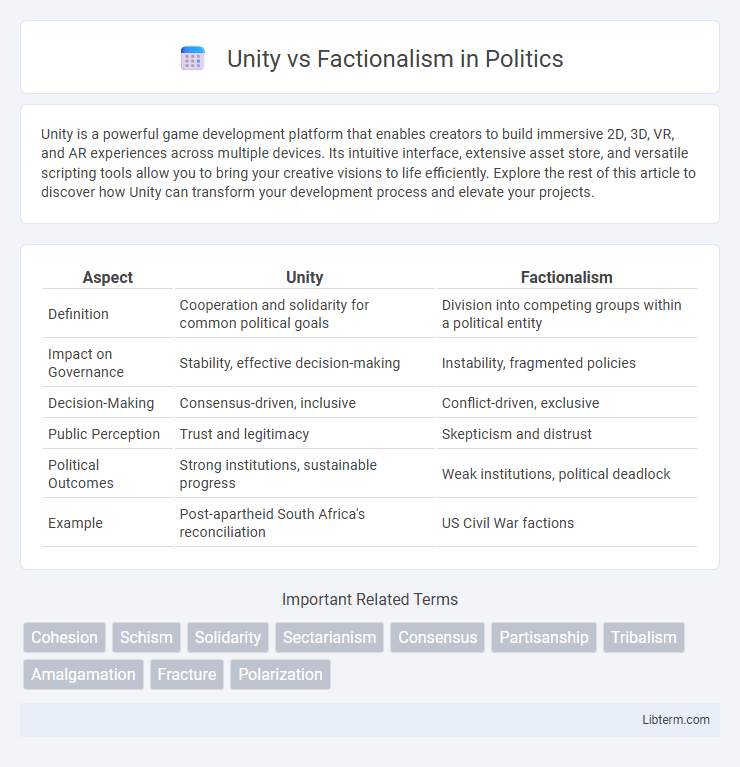Unity is a powerful game development platform that enables creators to build immersive 2D, 3D, VR, and AR experiences across multiple devices. Its intuitive interface, extensive asset store, and versatile scripting tools allow you to bring your creative visions to life efficiently. Explore the rest of this article to discover how Unity can transform your development process and elevate your projects.
Table of Comparison
| Aspect | Unity | Factionalism |
|---|---|---|
| Definition | Cooperation and solidarity for common political goals | Division into competing groups within a political entity |
| Impact on Governance | Stability, effective decision-making | Instability, fragmented policies |
| Decision-Making | Consensus-driven, inclusive | Conflict-driven, exclusive |
| Public Perception | Trust and legitimacy | Skepticism and distrust |
| Political Outcomes | Strong institutions, sustainable progress | Weak institutions, political deadlock |
| Example | Post-apartheid South Africa's reconciliation | US Civil War factions |
Understanding Unity and Factionalism
Unity represents collective harmony and cooperation among individuals or groups sharing common goals or values, fostering social stability and mutual support. Factionalism describes the emergence of subgroups within a larger community, often characterized by competing interests or ideologies that can lead to division and conflict. Understanding unity and factionalism involves analyzing the dynamics of group cohesion versus internal dissent, highlighting the impact on organizational effectiveness, political stability, and social cohesion.
Historical Roots of Unity and Division
Historical roots of unity often stem from shared cultural, religious, or linguistic identities that foster social cohesion and collective purpose within societies. In contrast, factionalism arises from divergent political interests, economic inequalities, and ethnic distinctions that create divisions and power struggles among groups. These opposing dynamics have shaped historical events, influencing the stability and development of civilizations across regions and eras.
Causes of Factionalism in Societies
Factionalism in societies often arises from economic disparities, ethnic or religious divisions, and competition for political power. Social identity theory explains how in-group favoritism and out-group hostility can deepen divides, while resource scarcity exacerbates tensions between factions. Historical grievances and unequal access to opportunities further fuel conflicts that challenge societal unity.
Benefits of Collective Unity
Collective unity fosters social cohesion, enabling communities to pool resources and talents for shared goals, which enhances problem-solving and innovation. It reduces conflict and political fragmentation by promoting a sense of belonging and mutual support, leading to increased stability and effective governance. Strong unity also amplifies collective bargaining power, driving social and economic progress more efficiently than fragmented factions.
Detrimental Effects of Factionalism
Factionalism erodes organizational cohesion by creating internal conflicts and division, which hinder effective decision-making and collaboration. It fosters mistrust among members, reducing morale and productivity while diverting focus from common goals. Persistent factional disputes can lead to fragmented leadership, weakening institutional stability and long-term success.
Unity in Political Movements
Unity in political movements strengthens collective action by aligning diverse groups toward common goals, increasing the likelihood of achieving meaningful social or policy change. Cohesive unity fosters trust and cooperation among members, enhancing strategic planning and resource mobilization essential for sustained influence. Historical examples demonstrate that unified movements, such as the Civil Rights Movement in the United States, have successfully challenged entrenched systems and propelled significant legislative reforms.
Factionalism and Social Fragmentation
Factionalism intensifies social fragmentation by creating isolated groups that prioritize narrow interests over collective well-being, leading to polarized communities. This division undermines trust and cooperation, eroding social cohesion and impeding effective governance and development. Persistent factionalism fosters conflict and exclusion, destabilizing societies and hindering inclusive progress.
Strategies to Foster Unity
Strategies to foster unity emphasize inclusive dialogue, shared goals, and collaborative decision-making among diverse groups. Building trust through transparency and mutual respect strengthens social cohesion and reduces factional tensions. Implementing community-building activities and equitable resource distribution promotes a sense of belonging and collective purpose.
Overcoming Factional Divides
Overcoming factional divides requires fostering inclusive dialogue that prioritizes shared goals and mutual respect among competing groups. Building trust through transparent communication and collaborative problem-solving strengthens cohesion and reduces polarization. Implementing policies that promote equitable resource distribution and representation helps bridge factional gaps, ensuring a unified community.
The Future: Balancing Diversity and Unity
Balancing diversity and unity requires fostering inclusive policies that celebrate cultural differences while promoting shared values and common goals. Future societies must implement frameworks encouraging dialogue, mutual respect, and collaboration to prevent factionalism from undermining social cohesion. Innovative governance models and digital platforms can facilitate this balance by bridging divides and strengthening collective identity.
Unity Infographic

 libterm.com
libterm.com